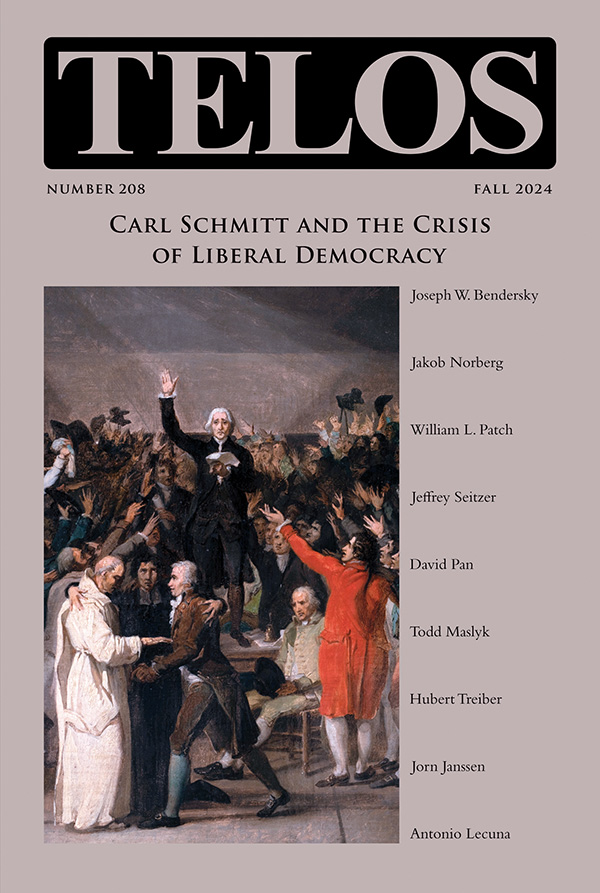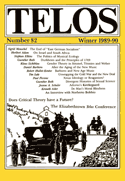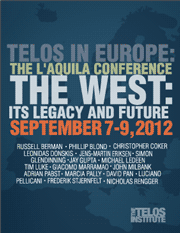By David Pan · Friday, October 18, 2024 Telos 208 (Fall 2024): Carl Schmitt and the Crisis of Liberal Democracy is now available for purchase in our store. Individual subscriptions to Telos are also available in both print and online formats.
 It hardly needs mentioning that liberal democracy is facing a number of threats today, both internal and external. Even if the political parties in the United States cannot agree on the main source of the threats, they both believe that democracy is in danger. Democrats point to the January 6 Capitol riot and Trump’s role in it as examples of the way in which liberal democratic procedures are being directly attacked. Republicans point to the Democratic-backed court cases against Trump as well as the FBI’s favoritism toward Democrats in their public announcements before elections as evidence that the legal system and the administrative state are being used to shut out political opponents. Both parties point to violations of free speech rights at college campuses, yet they also both seek to establish limits to those rights in defense of liberal democratic values. It hardly needs mentioning that liberal democracy is facing a number of threats today, both internal and external. Even if the political parties in the United States cannot agree on the main source of the threats, they both believe that democracy is in danger. Democrats point to the January 6 Capitol riot and Trump’s role in it as examples of the way in which liberal democratic procedures are being directly attacked. Republicans point to the Democratic-backed court cases against Trump as well as the FBI’s favoritism toward Democrats in their public announcements before elections as evidence that the legal system and the administrative state are being used to shut out political opponents. Both parties point to violations of free speech rights at college campuses, yet they also both seek to establish limits to those rights in defense of liberal democratic values.
Meanwhile, authoritarian governments in places such as China, Russia, Iran, and North Korea have becoming increasingly aggressive in opposing liberal democracies as threats to their own legitimacy. In doing so, they have attempted to provide theoretical justifications for their authoritarian rule that are based in anti-Western and anti-colonial discourses that align with critiques of the West advanced by left-leaning academics in liberal democracies.
Because they are based on freedom of expression and freedom of conscience, liberal democracies must allow open public spheres whose dynamics could take unforeseen directions that end up undermining the cultural and procedural foundations of liberal democratic governance. While the American Revolution provides the best example of the success of liberal democracy, the French Revolution and the Weimar Republic demonstrate spectacular failures. Outside of the West, the contrast between Taiwan and China and between Indonesian democracy and the Iranian Revolution indicate that we can find the same contrasts between failure and success in East Asia and in the Islamic world.
Continue reading →
By Maja Sidzinska · Tuesday, February 5, 2013 As an occasional feature on TELOSscope, we highlight a past Telos article whose critical insights continue to illuminate our thinking and challenge our assumptions. Today, Maja Sidzinska looks at Guenther Roth’s “Durkheim and the Principles of 1789: The Issue of Gender Equality,” from Telos 82 (Winter 1989).
 Guenther Roth positively establishes that the principles of 1789—liberté, egalité, fraternité—have been overridden by Émile Durkheim’s essentializing gender prescriptions in the service of social stability. He shows that mutually exclusive and unequal gender roles were central to Durkheim’s theory of organic solidarity. But Roth’s examination does more than just explain theoretical contradictions present in Durkheim’s work. His inquiry invites new investigations into Durkheim’s gender politics, the most intriguing one provoked by his comparative treatment of Durkheim’s and Marianne Weber’s perspectives on marriage and divorce. These contemporaries shared a political outlook yet diverged greatly in their ultimate directives for society. Guenther Roth positively establishes that the principles of 1789—liberté, egalité, fraternité—have been overridden by Émile Durkheim’s essentializing gender prescriptions in the service of social stability. He shows that mutually exclusive and unequal gender roles were central to Durkheim’s theory of organic solidarity. But Roth’s examination does more than just explain theoretical contradictions present in Durkheim’s work. His inquiry invites new investigations into Durkheim’s gender politics, the most intriguing one provoked by his comparative treatment of Durkheim’s and Marianne Weber’s perspectives on marriage and divorce. These contemporaries shared a political outlook yet diverged greatly in their ultimate directives for society.
Continue reading →
By David Pan · Wednesday, January 2, 2013 The following paper was presented at Telos in Europe: The L’Aquila Conference, held on September 7-9, 2012, in L’Aquila, Italy.
 Since the Treaty of Westphalia, sovereignty in the West has been imagined in terms of the nation-state and its ability to provide a universal basis for political relations both within state boundaries and in relations with other similarly organized entities. On the one hand, the nation-state originates as a means of overcoming the religious civil wars, and its establishment coincides with the attempt to relegate theological disputes to a private sphere that does not threaten the structure of the state. In this way, the state as opposed to the church becomes the primary form for defining the political. On the other hand, the development and stability of the nation-state system seems to have been inextricably linked to the dynamic of colonialism. As Carl Schmitt lays out in The Nomos of the Earth, the establishment of a jus publicum europaeum that created guidelines for limiting war between European states was accompanied and indeed predicated upon a complementary establishment of the amity lines that distinguished Europe from the rest of the world as the place of such limited war as against the “freedom” of the spaces beyond the line in which restrictions on warfare did not apply. For Schmitt, the relationship between these two dynamics, the coalescence of nation-state relations in Europe on the basis of a limitation of war and the establishment of unlimited war in those areas outside of Europe without nation-state structures, has not been coincidental but in fact constitutive for both the rise of the West and the structure of international relations in the modern world. Since the Treaty of Westphalia, sovereignty in the West has been imagined in terms of the nation-state and its ability to provide a universal basis for political relations both within state boundaries and in relations with other similarly organized entities. On the one hand, the nation-state originates as a means of overcoming the religious civil wars, and its establishment coincides with the attempt to relegate theological disputes to a private sphere that does not threaten the structure of the state. In this way, the state as opposed to the church becomes the primary form for defining the political. On the other hand, the development and stability of the nation-state system seems to have been inextricably linked to the dynamic of colonialism. As Carl Schmitt lays out in The Nomos of the Earth, the establishment of a jus publicum europaeum that created guidelines for limiting war between European states was accompanied and indeed predicated upon a complementary establishment of the amity lines that distinguished Europe from the rest of the world as the place of such limited war as against the “freedom” of the spaces beyond the line in which restrictions on warfare did not apply. For Schmitt, the relationship between these two dynamics, the coalescence of nation-state relations in Europe on the basis of a limitation of war and the establishment of unlimited war in those areas outside of Europe without nation-state structures, has not been coincidental but in fact constitutive for both the rise of the West and the structure of international relations in the modern world.
Continue reading →
|
|
 It hardly needs mentioning that liberal democracy is facing a number of threats today, both internal and external. Even if the political parties in the United States cannot agree on the main source of the threats, they both believe that democracy is in danger. Democrats point to the January 6 Capitol riot and Trump’s role in it as examples of the way in which liberal democratic procedures are being directly attacked. Republicans point to the Democratic-backed court cases against Trump as well as the FBI’s favoritism toward Democrats in their public announcements before elections as evidence that the legal system and the administrative state are being used to shut out political opponents. Both parties point to violations of free speech rights at college campuses, yet they also both seek to establish limits to those rights in defense of liberal democratic values.
It hardly needs mentioning that liberal democracy is facing a number of threats today, both internal and external. Even if the political parties in the United States cannot agree on the main source of the threats, they both believe that democracy is in danger. Democrats point to the January 6 Capitol riot and Trump’s role in it as examples of the way in which liberal democratic procedures are being directly attacked. Republicans point to the Democratic-backed court cases against Trump as well as the FBI’s favoritism toward Democrats in their public announcements before elections as evidence that the legal system and the administrative state are being used to shut out political opponents. Both parties point to violations of free speech rights at college campuses, yet they also both seek to establish limits to those rights in defense of liberal democratic values.  Guenther Roth positively establishes that the principles of 1789—liberté, egalité, fraternité—have been overridden by Émile Durkheim’s essentializing gender prescriptions in the service of social stability. He shows that mutually exclusive and unequal gender roles were central to Durkheim’s theory of organic solidarity. But Roth’s examination does more than just explain theoretical contradictions present in Durkheim’s work. His inquiry invites new investigations into Durkheim’s gender politics, the most intriguing one provoked by his comparative treatment of Durkheim’s and Marianne Weber’s perspectives on marriage and divorce. These contemporaries shared a political outlook yet diverged greatly in their ultimate directives for society.
Guenther Roth positively establishes that the principles of 1789—liberté, egalité, fraternité—have been overridden by Émile Durkheim’s essentializing gender prescriptions in the service of social stability. He shows that mutually exclusive and unequal gender roles were central to Durkheim’s theory of organic solidarity. But Roth’s examination does more than just explain theoretical contradictions present in Durkheim’s work. His inquiry invites new investigations into Durkheim’s gender politics, the most intriguing one provoked by his comparative treatment of Durkheim’s and Marianne Weber’s perspectives on marriage and divorce. These contemporaries shared a political outlook yet diverged greatly in their ultimate directives for society.  Since the Treaty of Westphalia, sovereignty in the West has been imagined in terms of the nation-state and its ability to provide a universal basis for political relations both within state boundaries and in relations with other similarly organized entities. On the one hand, the nation-state originates as a means of overcoming the religious civil wars, and its establishment coincides with the attempt to relegate theological disputes to a private sphere that does not threaten the structure of the state. In this way, the state as opposed to the church becomes the primary form for defining the political. On the other hand, the development and stability of the nation-state system seems to have been inextricably linked to the dynamic of colonialism. As Carl Schmitt lays out in
Since the Treaty of Westphalia, sovereignty in the West has been imagined in terms of the nation-state and its ability to provide a universal basis for political relations both within state boundaries and in relations with other similarly organized entities. On the one hand, the nation-state originates as a means of overcoming the religious civil wars, and its establishment coincides with the attempt to relegate theological disputes to a private sphere that does not threaten the structure of the state. In this way, the state as opposed to the church becomes the primary form for defining the political. On the other hand, the development and stability of the nation-state system seems to have been inextricably linked to the dynamic of colonialism. As Carl Schmitt lays out in 

